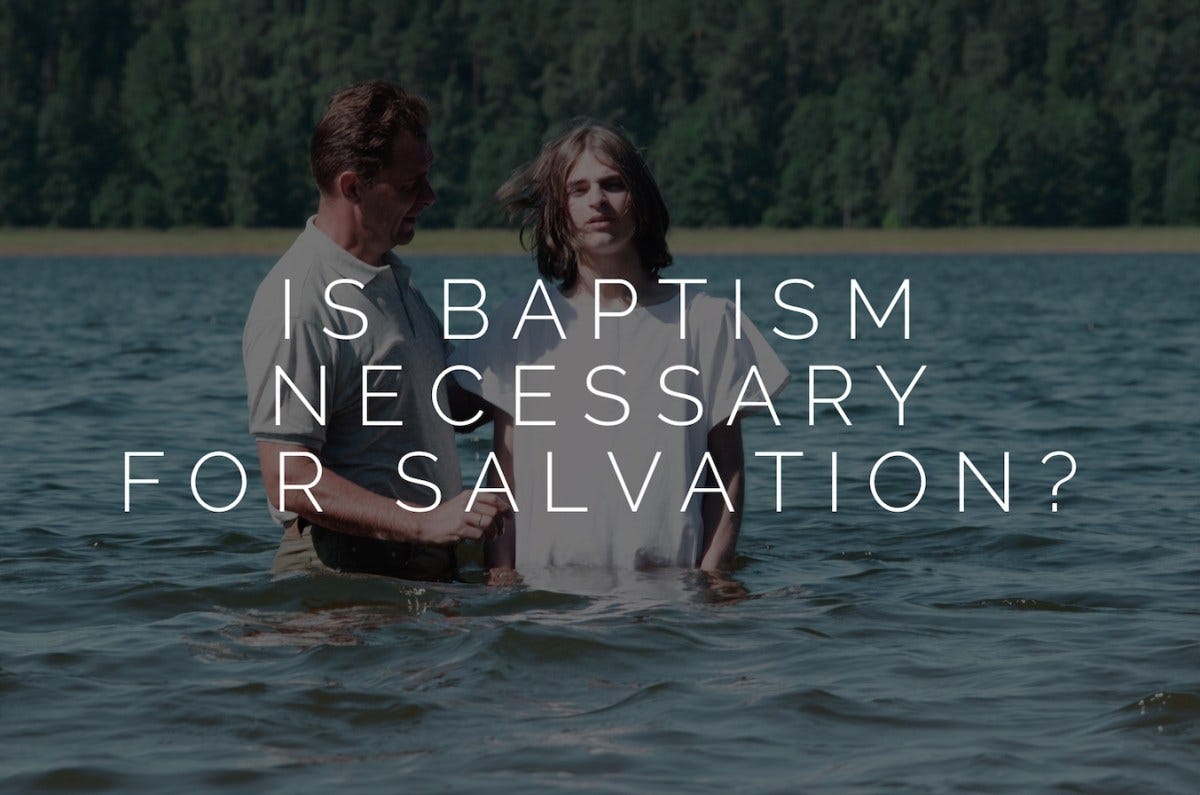“Calling on the Name of the Lord” – Is Baptism Necessary for Salvation?
A Response to Romans 10 Misuse
Many sincere believers point to Romans 10:9–13 and claim baptism is not necessary for salvation. They say, “The Bible says just believe and confess, and you’ll be saved.” But is that what Paul truly meant in Romans 10? Or is there more to “calling on the name of the Lord” than a simple confession? When we rightly divide God’s word (2 Timothy 2:15, NKJV), we’ll see that Romans 10 does not exclude baptism—it actually affirms it when understood in its full biblical context.
What Does Romans 10:9–13 Really Say?
Romans 10:9–10 (NKJV):
"That if you confess with your mouth the Lord Jesus and believe in your heart that God has raised Him from the dead, you will be saved."
Romans 10:13:
"For 'whoever calls on the name of the Lord shall be saved.'"
On the surface, this sounds like belief and confession alone bring salvation. But notice what’s not mentioned: repentance and baptism.
If one says baptism is not essential because it’s not mentioned here, then by the same logic, repentance must not be essential either—yet nearly all would agree repentance is necessary (Luke 13:3, Acts 17:30). So why the inconsistency?
Is Baptism in Romans 10? Yes—Through Joel 2:32
Romans 10:13 is a direct quote from Joel 2:32, which says:
“And it shall come to pass that whoever calls on the name of the Lord shall be saved.”
That same passage is quoted by Peter in Acts 2:21 on the day of Pentecost. But Peter doesn’t stop there. He explains how to call on the name of the Lord in Acts 2:38:
“Then Peter said to them, ‘Repent, and let every one of you be baptized in the name of Jesus Christ for the remission of sins; and you shall receive the gift of the Holy Spirit.’”
So, when the Jews heard the gospel and were “cut to the heart” (Acts 2:37), Peter didn’t lead them in a sinner’s prayer. He didn’t say “confess Jesus with your mouth.” He said repent and be baptized.
That’s the Holy Spirit’s interpretation of Joel 2:32—and it directly applies to Romans 10:13.
Paul’s Own Example: Acts 22:16
Paul, the very writer of Romans 10, shared how he was saved. In Acts 22:16, Ananias said to Paul:
“And now why are you waiting? Arise and be baptized, and wash away your sins, calling on the name of the Lord.”
Paul had already believed (Acts 9), fasted and prayed for three days (Acts 9:9,11), and confessed Jesus as Lord (Acts 9:5). Yet his sins remained—until he was baptized.
So what does it mean to “call on the name of the Lord”? According to both Peter (Acts 2:21–38) and Paul (Acts 22:16), it includes baptism.
Baptism Is Not a Work—It’s Faith in God’s Working
Some argue that requiring baptism makes salvation by works. But Colossians 2:12 says otherwise:
“...buried with Him in baptism, in which you also were raised with Him through faith in the working of God, who raised Him from the dead.”
Baptism is not us working—it’s God who works in baptism. It is our appeal to God, trusting in His promise to cleanse us by Christ’s blood.
1 Peter 3:21 (NKJV):
“There is also an antitype which now saves us—baptism (not the removal of the filth of the flesh, but the answer of a good conscience toward God), through the resurrection of Jesus Christ.”
Context Matters: Romans Was Written to the Baptized
Romans 6:3–4 (NKJV):
“Or do you not know that as many of us as were baptized into Christ Jesus were baptized into His death? Therefore we were buried with Him through baptism into death...”
Paul was writing to Christians who had already been baptized. In Romans 10, he’s not laying out every step to salvation—he’s emphasizing faith in Christ over law-keeping, particularly to the Jews who were rejecting God's new covenant plan.
Romans 10:1–3:
“...they have a zeal for God, but not according to knowledge. For they being ignorant of God’s righteousness, and seeking to establish their own righteousness, have not submitted to the righteousness of God.”
God’s righteousness includes baptism into Christ. Those refusing it are rejecting God's way of salvation—even if they're sincere.
Will We Submit to God’s Plan or Ours?
To say Romans 10 removes the necessity of baptism is to ignore what Peter and Paul—inspired by the Holy Spirit—said elsewhere about salvation.
Peter: “Repent and be baptized...for the remission of sins.” (Acts 2:38)
Paul: “Arise and be baptized, and wash away your sins, calling on the name of the Lord.” (Acts 22:16)
They both interpreted Joel 2:32 the same way. So if your interpretation of Romans 10 excludes baptism, it’s not the same as Peter’s or Paul’s. Whose explanation will you follow?
Let us not pick and choose verses but harmonize all of God’s word. Baptism is not an optional step—it is how we call on the name of the Lord, submitting to His righteousness, not our own.






Nice exposition, thanks.
Thank you brother Kenneth!
5 C’s are seen when we’re 👀 looking 👀 for truth of Gods N.T. plan of salvation. That is;
Calls to Conversion in Christ Consist of His Commands.
(5 C’s) see 👀 😃